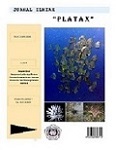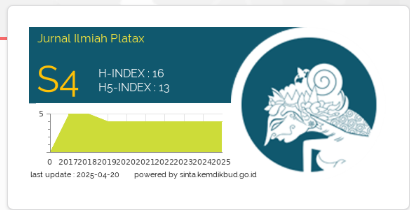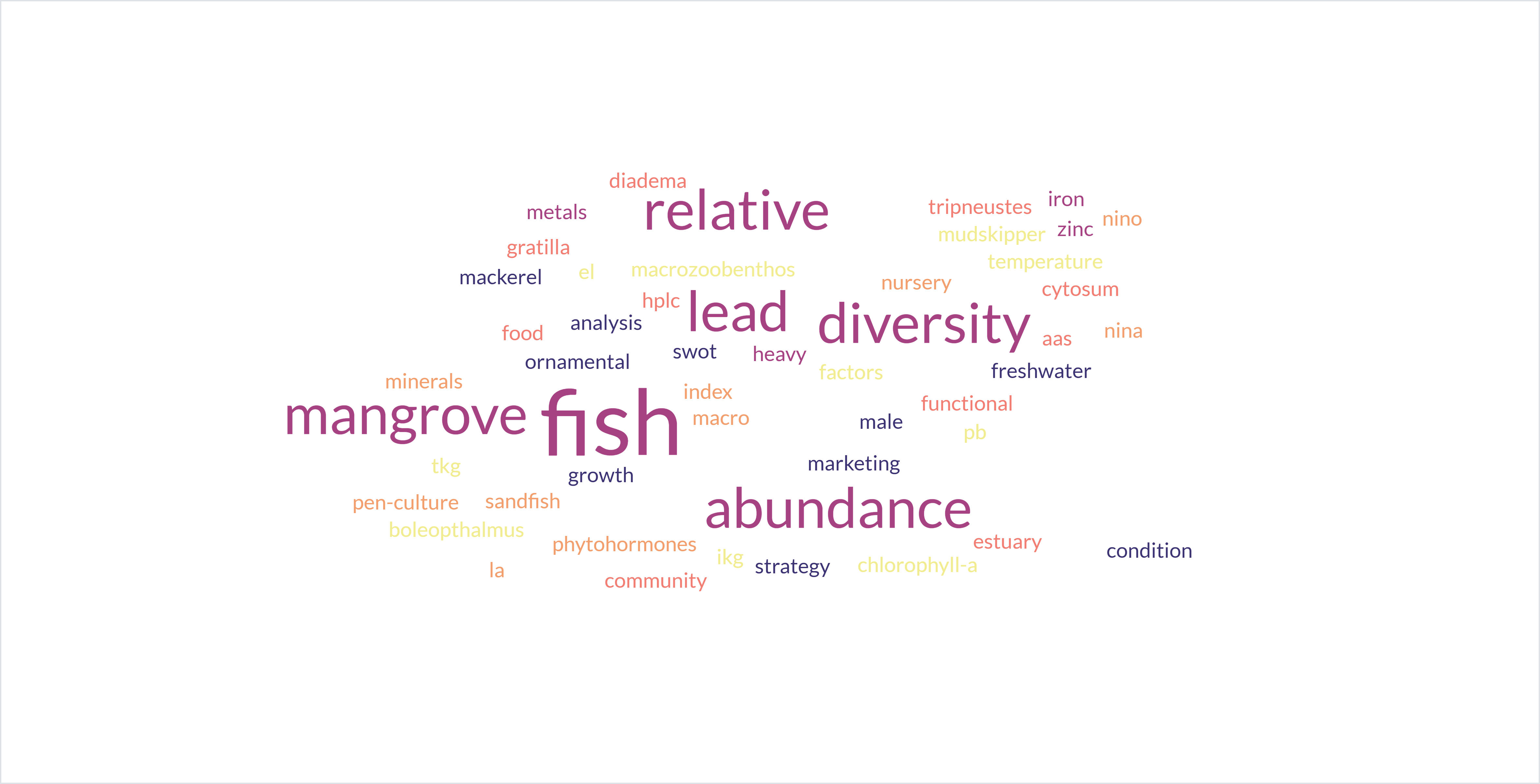Types and Size Distribution of Parrotfish (Family Scaridae) Caught with Gillnets in the Waters off Taduna Village, Kabaruan Island.
DOI:
https://doi.org/10.35800/jip.v11i2.52035Keywords:
Parrotfish;, Scaridae;, fish morphometrics;, Kabaruan Village;Abstract
The objective of this research is to identify the types and size distribution of parrotfish in the waters of Taduna Village. The research was conducted using sampling methods. Samples were collected over a period of two months from the catches landed in Taduna Village by local fishermen. The fishermen used gillnets for their catches. The length of each fish was measured from the tip of the mouth to the end of the tail using a millimeter-scale ruler with a precision of 0.1 cm. The weight of the fish was measured using a digital scale with a resolution of one gram. The length of each species was analyzed using frequency distribution and presented in length and weight histograms.
Based on the data obtained from the measurements of Family Scaridae fish, a total of 53 individuals were collected, consisting of 8 species: Chorurus bleekeri (11 individuals), Calotomus carolinus (4 individuals), Chorurus japanensis (6 individuals), Chlorurus microrhinos (2 individuals), Scarus frenatus (16 individuals), Scarus russell (4 individuals), Scarus spinus (5 individuals), and Scarus tricolor (5 individuals). The distribution of Family Scaridae fish in the waters off Taduna Village shows varying lengths and weights for each species. For example, Chorurus bleekeri ranged from 18.9 to 26.5 cm in length and weighed between 150 and 394 grams, Chorurus japanensis had a length distribution between 17.5 and 27.4 cm and weighed from 119 to 465 grams, and Scarus frenatus ranged from 18.3 to 24.5 cm in length and weighed between 117 and 308 grams."
Keywords: Parrotfish, Scaridae, Types, Size, Kabaruan.
Abstrak
Tujuan penelitian ini yaitu untuk mengetahui jenis dan distribusi ukuran ikan kakatua di perairan Desa Taduna. Penelitian ini menggunakan metode sampling. Pengambilan sampel dilakukan dalam waktu dua bulan dari hasil tangkapan nelayan yang didaratkan di Desa Taduna. Alat yang digunakan nelayan adalah jaring insang mono filamen. Seluruh panjang ikan diukur dari ujung mulut hingga ujung ekor dengan penggaris skala milimeter dengan ketelitian 0,1 cm. Berat ikan diukur dengan timbangan digital dengan resolusi satu gram. Panjang setiap spesies dianalisis menggunakan distribusi frekuensi dan ditampilkan dalam histogram panjang dan berat.
Berdasarkan data hasil pengukuran ikan Famili Scaridae diperoleh sebanyak 53 individu yang terdiri dari 8 spesies yaitu Chorurus bleekeri (11 individu), Calotomus carolinus (4 individu), Chorurus japanensis (6 individu), Chlorurus microrhinos (2 individu), Scarus frenatus (16 individu), Scarus russellii (4 individu), Scarus spinus (5 individu) dan Scarus tricolor (5 individu). Distribusi ikan Famili Scaridae di perairan depan Desa Taduna memiliki ukuran panjang dan berat yang bervariasi yaitu spesies Chorurus bleekeri berkisar 18,9-26,5 cm dan berat 150-394 gram, Chorurus japanensis memiliki distribusi ukuran panjang berkisar 17,5-27,4 cm dan berat 119-465 gram dan Scarus frenatus memiliki distribusi ukuran panjang berkisar 18,3-24,5 cm dan berat 117-308 gram.
Kata kunci : Ikan kakatua, Scaridae, Jenis, Ukuran, Kabaruan
References
Adrim, M. (2008). Aspek biologi Ikan Kakatua (Suku Scaridae). Jurnal oseana. 33(1),41-50.
Bellwood, D.R. 1994. A phylogenetic study of the parrotfishes Family Scaridae (pisces: Labroidei), with a revision of genera. Department of Marine Biology. James Cook University of North Queensland, Townsville. Qld 4811. Australia. 86 p
Bellwood, D.R., 2001. Scaridae. Parrotfishes. p. 3468-3492. In K.E. Carpenter and V. Niem (eds.) FAO species identification guide for fishery purposes. The living marine resources of the Western Central Pacific. Vol. 6. Bony fishes part 4 (Labridae to Latimeriidae), estuarine crocodiles. FAO, Rome.
Beaufort, L.F. 1940. The Fishes of the Indo-Australian Archipelago. E.J. Brill, Leiden: 508 pp.
Bruce, R.W. and J.E. Randall, 1985. A revision of the Indo-West Pacific parrotfish genera Calotomus and Leptoscarus (Scaridae: Sparisomatinae). Indo-Pac. Fish. (5):32 p.
Chen, L.S. 2002. Post-settlement diet shift of Chlorurus sordidus and Scarus schlegeli (Pisces: Scaridae). Zool. Stud. 41:47-58.
Fischer, W and Whitehead, P. J. P. 1974. FAO species identification sheets for fishery purposes. Eastrem Indian Ocean (Fishing area 57) and Western Central Pacific (Fishing area 71), Vol. 1-4.
Koichi, S, T, Peristiwady, and S.R. Suharti, 2000. Summary by Family, with number of species Fishes of Bitung Northern Tip of Sulawesi, Indonesia. Situs:https://www.kahaku.go.jp/research/db/zoology/Fishes_of_Bitung/introduction2.html
Kuiter, R.H. and T. Tonozuka, 2001. Pictorial guide to Indonesian reef fishes. Part 2. Fusiliers - Dragonets, Caesionidae - Callionymidae. Zoonetics, Australia. 304-622 p.
Liao, Y.C.; L.S. Chen; K.T. Shao and I.S. Chen 2004. A Review of Parrotfishes (Perciformes: Scaridae) of Taiwan with Descriptions of Four New Records and One Doubtful Species. Zool. Stud. 43(3): 519-536
Lieske, E. and R. Myers, 1994. Collins Pocket Guide. Coral reef fishes. Indo-Pacific & Caribbean including the Red Sea. Haper Collins Publishers, 400 p
Masuda, H., K Amaoka, C. Araga, T. Uyeo and T. Yoshino, 1984. The fishes of the Japanese Archipelago. Vol. 1. Tokai University Pres, Tokyo, Japan. 437 p.
Myers, R.F. 1989. Micronesian Reef Fishes: A Practical Guide to the Identification of the Coral Reef Fishes of the Tropical Central and Westren Pacific.
Myers, R.F., 1991. Micronesian reef fishes. Second Ed. Coral Graphics, Barrigada, Guam. 298 p.
Myers, R.F., 1999. Micronesian reef fishes: a comprehensive guide to the coral reef fishes of Micronesia, 3rd revised and expanded edition. Coral Graphics, Barrigada, Guam. 330 p.
Nelson, J.S., T.C. Grande, M.V. H. Wilson. 2016. Fishes of the world. Fifth edition. Hoboken, New Jersey: John Wiley & Sons. 707 p.
Nybakken, J.W. 1988. Biologi Laut: Suatu Pendekatan Ekologis. PT. Gramedia, Jakarta.
Parenti, P. and J.E. Randall. 2000. An annotated checklist of of the species of lte Labroid fish families Labridae and Scaridae. Ichthyological Bulletin. 68: 1- 97.
Romero, P. (2002). An etymological dictionary of taxonomy. Madrid, unpublished.
Randall, J.E. and J.H. Choat, 1980. Two new parrotfishes of the genus Scarus from the Central and South Pacific, with further examples of sexual dichromatism. Zool. J. Linn. Soc. 70:383-419.
Randall, J.E., 1986. Scaridae. p. 706-714. In M.M. Smith and P.C. Heemstra (eds.) Smiths' sea fishes. Springer-Verlag, Berlin.
Randall, J.E., G.R. Allen and R.C. Steene, 1990. Fishes of the Great Barrier Reef and Coral Sea. University of Hawaii Press, Honolulu, Hawai. 506 p.
Sale, P.F. 1991. The Ecology of Fishes on Coral Reefs. Academic Press, Inc. San Diego, 754 pp
Sturges, H.A. 1926. The choice of a class interval. Journal of the American Statistical Association. 21: 65-66
Downloads
Published
How to Cite
Issue
Section
License
Copyright (c) 2023 Agustiani M. V. Rumping, Ari B. Rondonuwu, Khristin F I. Kondoy, Jans Djoike Lalita, Jetty K. Rangan, Leonard J. Tombokan

This work is licensed under a Creative Commons Attribution-NonCommercial 4.0 International License.
COPYRIGHT
Authors who publish with this journal agree to the following terms:
Authors hold their copyright and grant this journal the privilege of first publication, with the work simultaneously licensed under a Creative Commons Attribution License that permits others to impart the work with an acknowledgment of the work's origin and initial publication by this journal.
Authors can enter into separate or additional contractual arrangements for the non-exclusive distribution of the journal's published version of the work (for example, post it to an institutional repository or publish it in a book), with an acknowledgment of its underlying publication in this journal.
Authors are permitted and encouraged to post their work online (for example, in institutional repositories or on their website) as it can lead to productive exchanges, as well as earlier and greater citation of the published work (See The Effect of Open Access).






































